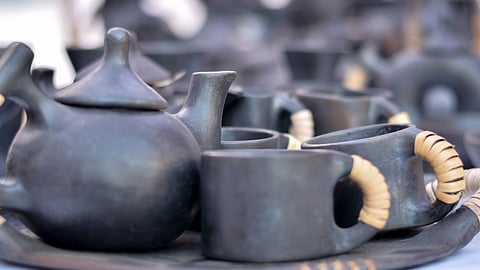
- Destinations
- Experiences
- Stay
- What's new
- Celebrating People
- Responsible Tourism
- CampaignsCampaigns
- SubscribeSubscribe
- Buy Now

Northeast India is a region of rich diversity, culture, and natural beauty. It comprises of eight states: Arunachal Pradesh, Assam, Manipur, Meghalaya, Mizoram, Nagaland, Sikkim, and Tripura. Each state has its own unique identity, history, and traditions, which are reflected in its handloom and handicraft products.
If you are planning to visit this part of India, you will be amazed by the variety of souvenirs you can buy from the local markets, shops, and artisans. Here are some of the most unique and attractive souvenirs you can buy from Northeast India.
The Naga shawl is a traditional garment worn by the Naga tribes of Nagaland. It is crafted from wool or cotton and has distinctive patterns and colours, usually red, black, and white. The shawl is a symbol of the tribe’s identity, culture, and status, and each tribe has its own design and meaning, making each shawl a unique piece of art. The shawl is also a sign of bravery, as it was once worn by the warriors who had performed heroic deeds.
When visiting Northeast India, you can find these exquisite shawls in the local markets of Kohima, Dimapur, and Mokokchung. Each shawl you encounter is a result of meticulous craftsmanship, often woven by local artisans who have inherited and perfected their skills over generations. Purchasing a Naga shawl is not just buying a souvenir; it's an act of preserving and participating in the rich cultural heritage of Nagaland.
Northeast India is famous for its tea production, especially Assam, which is the largest tea-growing region in the world. The tea grown in Assam has a strong, malty, and rich flavour, and is known as CTC (crush, tear, curl) tea. You can buy fresh and organic tea leaves from the tea estates and gardens of Jorhat, Dibrugarh, and Tinsukia.
You can also buy tea from other states of Northeast India, such as Sikkim, which produces the exotic Temi tea, and Tripura, which produces the fragrant Tripureshwari tea.
Purchasing organic tea from Northeast India means bringing home a piece of the region's natural bounty and tradition. Each variety of tea reflects the unique climatic conditions and rich soil of the area it's grown in, making these teas not just souvenirs but also ambassadors of the diverse flavours and heritage of Northeast India.
Textile weaving has been a vital contributor to the economic growth of rural areas in Tripura, showcasing its historical significance. Traditionally, every household in the region possessed a handloom, emphasising self-sufficiency as families intricately crafted their attire rather than purchasing from external sources.
Risa and riha stand out as the symbolic handwoven fabrics of the state, recognised for their vibrant hues and detailed tribal patterns. These fabrics symbolise cultural richness and serve as a testament to the skilled craftsmanship passed down through generations. Even today, the legacy of textile weaving endures as a cornerstone of Tripura's heritage, preserving its cultural identity while continuing to bolster the local economy by promoting and selling these exquisite, handcrafted textiles.
Longpi Hamlei pottery is a unique form of pottery that is made in the village of Longpi in Manipur. It is also known as black pottery, as it has a dark colour and a shiny finish. The pottery is made from a mixture of black serpentinite stone and brown clay, which are found only in Longpi.
The pottery is shaped by hand, without using a potter’s wheel, and is fired in a kiln This makes each piece distinct and unique. The pottery is then polished with a local plant called pasania pachiphylla, which gives it a glossy look. You can buy Longpi Hamlei pottery items, such as pots, bowls, cups, plates, and vases, from the markets and shops of Imphal, the capital of Manipur.
Jaapi hat is a traditional hat worn by the people of Assam. It is made of bamboo and tokou (palm) leaves and has a conical shape and a wide brim. The hat is decorated with colourful motifs and designs, such as flowers, animals, and geometric patterns. The hat was originally used by the farmers and fishermen of Assam, as it protected them from the sun and rain.
The hat is also used as a symbol of honour and respect and is presented to guests and dignitaries. The hat is also used by the dancers of the Bihu dance, the folk dance of Assam. You can buy Jaapi hats from the markets and shops of Guwahati, Tezpur, and Jorhat.
Kauna mat is a type of mat that is made from a reed called kauna, which grows in the marshy areas of Manipur. The reed is dried, dyed, and woven into mats of various sizes and shapes. The mats are soft, durable, and water-resistant and are used for various purposes, such as sitting, sleeping, praying, and decorating.
The mats are also embellished with colourful patterns and designs, such as flowers, animals, and geometric shapes. You can buy kauna mats from the markets and shops in Imphal, Moirang, and Ukhrul. These mats are a tangible connection to the sustainable practices and artistic expressions of Northeast India.
